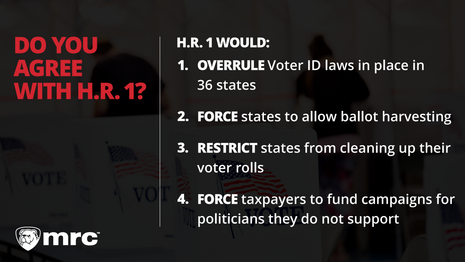Bias on Display: AP Fact Check Says MRC Graphic Shares ‘Incomplete Information’
April 22nd, 2021 9:18 AM
Facebook’s fact-checkers are covering for the left’s huge election power grab in H.R. 1. A far left AP fact-checker spent 850 words trying, and failing, to debunk a graphic about the bill.
AP News fact-checked a graphic from the Media Research Center on Facebook and claimed it was “missing context.” In reality, the AP fact-checker, far-left reporter Terrence Fraser, just didn’t like the language that the graphic used.
The first point that the graphic made was that H.R. 1 would “OVERRULE Voter ID laws in place in 36 states.” Fraser responded by saying that the bill would allow “voters to affirm their identity using only their signature, but the proposed legislation only applies in federal elections.” But, as The Daily Signal pointed out, “states obviously can’t enforce their voter ID requirements if federal law says they have to allow anyone who just signs a form to vote.”
Whether state Voter ID laws would, technically, remain on the books if H.R. 1 passes is irrelevant, particularly in states where a state election is held at the same time as a federal election.
The graphic then said that H.R. 1 would “FORCE states to allow ballot harvesting.” Fraser responded to the claim by saying, “The practice of a third party collecting multiple absentee ballots from voters is often referred to as ‘ballot harvesting’ by critics to suggest something nefarious.” And then in the very next sentence, he confirmed exactly what the graphic alleged: “The proposed legislation would prevent states from limiting the number of ballots that an individual can collect, but would bar individuals from receiving payments based on the number of ballots collected.” Instead of responding to concerns over ballot harvesting, Fraser simply decided that the language was problematic, while admitting the problem.
Fraser cited Richard Briffault, law professor at Columbia, who said, “The idea is that community groups, neighbors or even family members might gather absentee ballots from people and bring them in together.” Again, Fraser’s supposed rebuttal does not address the core issue of ballot harvesting, and instead threw a handful of glittery language over the pile of flaming garbage that is H.R. 1.
The next claim that Fraser addressed was that H.R. 1 would “RESTRICT states from cleaning up their voter rolls.” Fraser responded by, and you can’t make this up, describing exactly how the bill restricts states from cleaning up their voter rolls. “H.R. 1 would prevent states from removing voters from the rolls who haven’t cast a ballot in any election, or who haven’t responded to a government notice (except if the notice is returned as undeliverable),” said Fraser. States could still “remove voters who have moved or died,” he claimed, but the graphic did not allege that states could not remove voters in those situations.
Fraser left out a very important change made in H.R. 1 that would absolutely make it more difficult for states to maintain clean voter rolls: Under current federal law, a state must stop programs that remove ineligible voters from the rolls within 90 days before a federal election. The new Democratic law expands that blackout period for many programs to six months before any federal election, greatly reducing states’ ability to remove voters who move, die, or otherwise make themselves ineligible to vote in an election year.
The final line of the graphic said, “The bill would “FORCE taxpayers to fund campaigns for politicians they do not support.” Fraser claimed “money from regular American taxpayers is not involved.” In response to opponents’ complaints about this issue, the latest version of H.R. 1 added language that says the funding for this provision would come from a new surcharge (i.e., a tax) on criminal and civil penalties as well as settlements from corporations, corporate officers, and some tax code violators. It’s not a stretch to view anything the government takes from penalties and surcharges as a tax. Companies typically pass those increases to customers.

Fraser’s biased analysis of MRC’s graphic is typical for far-left “journalists.” His bio on AP’s own website said that he “has worked for VICE Media, The Marshall Project and ProPublica,” three very liberal organizations. The Marshall Project has published articles such as “How Biden Can Reverse Trump’s Death Penalty Expansion” and “Why Is It So Hard To Prosecute White Extremists?”
Another bio from the Ida B. Wells Scholar program said that Fraser’s dream job is “to write for The Nation or do documentary videos for The Intercept.” Two more leftist journalism operations.
Essentially, Fraser’s “fact-check” simply adds Democratic spin to the items in the social media post being reviewed. None of his points disproves any aspect of the post. The only way to avoid an opening for AP to claim the post is “missing context” would have been to include every one of the thousands words of the massive bill in the social media post, and even that likely wouldn’t have stopped AP from working with Facebook to discredit this post. Clearly, neither the Associated Press nor Facebook want the public to know what is in H.R. 1. Politifact, similarly, asked MRC to back up the information in the Biden's untruthful statements chart, but never marked the chart as “true.”